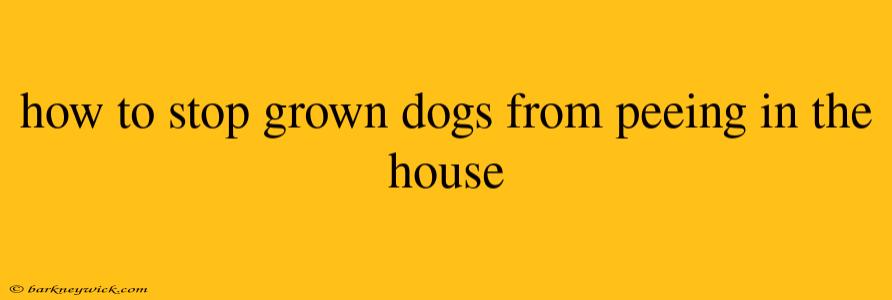It's frustrating to deal with a grown dog who suddenly starts peeing in the house. It can be even more confusing when the dog has been house-trained for years. Before you throw in the towel, there are many things you can try to solve this problem. Let's dive in!
Determine the Cause:
The first step is to understand why your dog is suddenly having accidents. There are many possible causes, including:
- Medical Issues: Urinary tract infections, kidney disease, diabetes, and other medical conditions can affect a dog's bladder control. A vet visit is essential to rule out any underlying health issues.
- Stress or Anxiety: Changes in your dog's routine, like a new pet, a move, or a family member leaving, can lead to stress and anxiety, which can manifest as inappropriate urination.
- Marking: Dogs may urinate in the house to mark their territory, especially if there are new people or animals in the home.
- Cognitive Decline: Older dogs may experience cognitive decline, which can lead to confusion and accidents.
- Lack of Training: If your dog was never properly house-trained, or if the training has slipped, accidents are more likely.
Solutions:
Once you've identified the cause, you can start working on a solution:
Medical Issues:
- Vet Visit: If you suspect a medical issue, take your dog to the vet immediately. Treatment for the underlying condition will usually resolve the problem.
Stress or Anxiety:
- Create a Calming Environment: Provide your dog with a safe space, like a crate or dog bed, where they can relax.
- Reduce Stress: Minimize changes in your dog's routine as much as possible. Offer calming aids like calming chews, pheromone diffusers, or a Thundershirt.
Marking:
- Neuter or Spay: If your dog hasn't been neutered or spayed, this can help reduce marking behavior.
- Clean Thoroughly: Use an enzymatic cleaner to remove the urine odor from any areas your dog has peed. The scent can trigger further marking.
Cognitive Decline:
- Regular Vet Checkups: Ensure your dog is receiving regular vet checkups to monitor their health and cognitive function.
- Maintain Routine: Keep your dog's routine as consistent as possible to help them stay oriented.
- Provide Mental Stimulation: Engage your dog in activities like puzzle toys, scent games, or training sessions.
Lack of Training:
- Start with Basic House Training: If your dog has never been house-trained, start with the basics. Take your dog out frequently, praise them for going outside, and use positive reinforcement techniques.
- Reinforce Training: Even if your dog was previously house-trained, re-establish a consistent routine and reinforce good behavior.
Tips for Success:
- Consistency: Be consistent with your training and routine.
- Positive Reinforcement: Use treats, praise, and toys to reward good behavior.
- Patience: House-training takes time and patience. Don't get discouraged if you don't see results immediately.
- Professional Help: If you're struggling, consider consulting a professional dog trainer or behaviorist.
By addressing the underlying cause and using the right strategies, you can help your grown dog stop peeing in the house and create a happy and healthy home for both of you.
